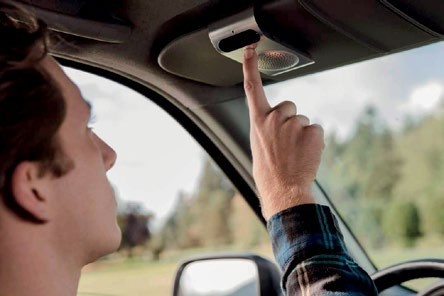The connected car as a standard is closer than ever.


A CONNECTED WORLD
CES 2019 has just come to an end, with 5G and Wi-Fi 6 announcements deservedly taking to the forefront. In a nutshell, the two technologies will give you faster wireless data connectivity both in and out of the home. Wi-Fi 6 enables simultaneous connection of more devices at a wider range than before, and 5G promises better connectivity everywhere with better speeds, allowing you to do more.
Call it moving from the connected home to the connected world. In that aspect, the other development worth noting is how Smart Assistants are moving out from the home onto the roads. The term “smart car” as we envision it probably brings to mind autonomous driving vehicles that not only take you from one place to the other, but park themselves perfectly too.
How cars will be the bridge between your smartphone and smart home
That’s certainly something automobile manufacturers are working towards, but today’s cars are actually plenty smart too, with the ability to connect your mobile phone to the in-dash system for entertainment or navigation purposes. This year, cars have gone further, with device makers and telcos like Verizon putting in the full smart assistant experience by way of connected car accessories that come with Google Assistant or Amazon Alexa. Connected cars are also coming with their own cellular connection thanks to embedded SIM cards, hence taking away reliance on your mobile phone.
In China, Alibaba’s A.I Labs have been busy putting Tmall Genie into cars. They’ve also already paired up with Volvo, Audi and Daimler of Germany to begin offering home-to-car services via Tmall Genie Auto, which allows drivers to control Tmall Genie-compatible devices in their home from their cars. The Tmall Genie ecosystem already includes over 90 appliance brands and 600 smart home appliances that can be easily connected to this car-to-home services. And there are already over 600,000 AliOS-equipped vehicles on the roads at the moment, so the potential there is tremendous to say the least.
Picture this: you’re two blocks from home and you start the air-conditioning in your living room from your car so it’s nice and cool by the time you’ve parked. The reverse can also be true, so if it’s winter for example, you can start the engine of your car before you step out of the house so it’s nice and warm before you get in.
Now, wouldn’t it be great if you’re driving home and the car’s smart assistant recommends you a route that takes you past the local supermarket because the smart refrigerator at home has informed it that you’re out of eggs? Being able to book tickets with your voice while driving to the cinema would certainly be nice too, as would the potential for every purchase to be tied to the same rewards program so that virtually everything you do earns you points. With the same virtual assistant in your car that’s on your phone, that’s certainly possible.
Get your tin-foil hats ready
Leveraging on geofencing technology means that you can set things in motion simply by passing certain checkpoints, but that also means consenting to having your whereabouts tracked constantly. Getting tied into a single system also means the company responsible (and its partners) will have access to all of your daily lifestyle preferences. From what music you like to have on in the mornings, to your favorite restaurants and how often you go there!
That’s certainly valuable information that can both provide great convenience and at the same time be an immense compromise in privacy and personal data security. An age-old trade-off for sure, but that’s one the Amazons and Googles of the world will hope to address for the chance to literally be that voice in your ears. In fact, Counterpoint Insights has forecast that the global connected car market will grow 270% by 2020, with more than 125 million connected passenger cars shipped between 2018 and 2022, so we’re certainly not alone in seeing how this is a key market.


Tmall Genie.

Verizon Hum

JBL Link Drive.

Google Assistant (Android Auto)

BMW Intelligent Personal Assistant

Apple CarPlay

Tmall Genie
Alibaba’s option for the China market, this offers users control of car functions via Tmall Genie speakers, and vice versa. So, you can turn off the air-conditioning of your car and lock the doors from a speaker at home, or even book a movie ticket from your car.























